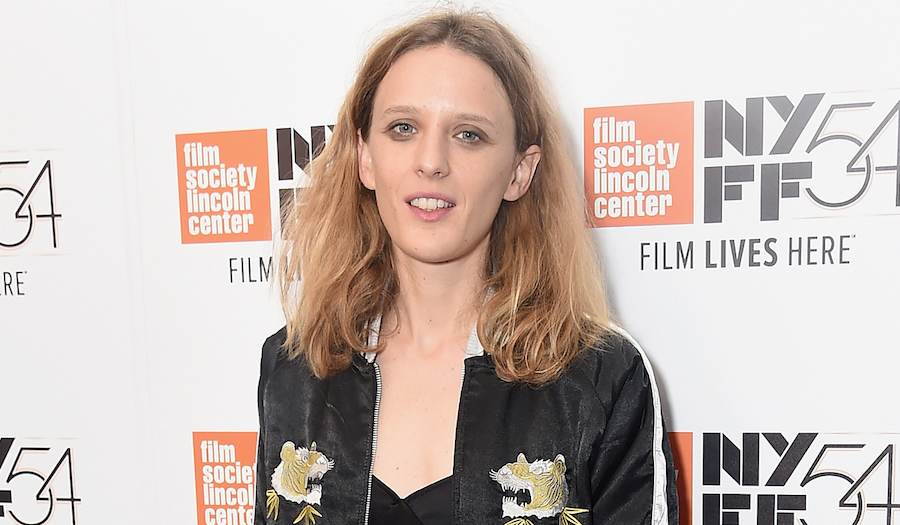Mia Hansen-Love likes to draw from her life. But it’s not always her own specific experiences that wind up onscreen. The French filmmaker’s last film, “Eden,” was inspired by her brother, who was a DJ who fell on hard times as he effectively aged out of his profession. Her fifth, “Things to Come,” is not specifically about her parents, both philosophy teachers, but it is about a longtime couple with the same profession. The film’s hero, Isabelle Huppert’s Nathalie, plays a teacher who watches as her life crumbles around her: her mother is dying, she loses her job and her husband (Andre Marcon) leaves her for another woman. It’s a more vulnerable role than we’re used to seeing from Huppert — contrast it her venomous turn in Paul Verhoeven’s “Elle,” now in American theaters — yet the legendary actress gives Nathalie a strength that makes Nathalie even more fascinating. The 35-year-old filmmaker, whose other works include “Father of My Children” and “Goodbye First Love,” speaks to us — shouts, really, in a noisy Central Park-adjacent hotel restaurant — about drawing on those around her for her films, getting her mom to help her write dialogue and being scared, sort of, sometimes, of Isabelle Huppert. What motivated you to do make your fifth film about philosophy teachers? Did you have to do much research on philosophy, or did you parents drill some of the names you drop — Theodor Adorno, Max Horkheimer, etc. — into your head? If you don’t have a career in philosophy, it can be difficult to remember what each philosopher said. Nathalie finds herself hobnobbing with a young philosophy student named Fabien. It would be simplistic to say the film thinks they’re naive and she’s simply outgrown idealism. A lot of your films concern the same anxiety: They’re about people who had this idea that something key about their lives would be there forever — be it relationships or jobs or certain people — and then we see that ripped away from them. Their entire worlds collapse and they struggle to build up a new one. It’s interesting to watch Isabelle Huppert in a film where she’s not going to extremes. She’s still prickly, though, and very, very strong.
I grew up in a world of intellectuals. I was very influenced by the atmosphere of that world. But for some reason, I waited until now to show that world in a very direct way. You can see it a bit in my films from the very beginnings. But it was never up front. This was the first time I really depicted the world I grew up in, as I see it. Most of my stories have been partly influenced by my experiences, even though my films aren’t autobiographical, because being autobiographical would mean I was depicting my own life. And I’ve never made a film about a filmmaker — yet. We’ll see. [Laughs] My films are always mixtures of events I observe in life, but also memories. I’ll change some [memories], though, because I’ve forgotten some things.
Those ones I knew very well. All the names in the film came up in my youth, when I was living with my parents. I didn’t have to look up the names I would put in the film. But when I was writing the classroom scenes, I would sometimes have to call mother and ask her about the right references and quotations. Sometimes I would remember some text or a general idea, but I didn’t know exactly where it came from. She would also help me with the scenes where we see [Nathalie] teaching. I wouldn’t know how to write a fake philosophy lesson; I’m not good enough in that field to find the right words. I basically asked my mother to make those scenes sound credible. I would tell her to do a lesson about sublime love or the notion of truth or democracy, and she would help me with what would be said. Then I would reword her scenes. That’s what I did with “Eden,” with my brother, except we only did that with a few scenes. In my films I like to depict a world. In this case it was the world of philosophy, but my previous films have been about music [“Eden”], or about a film production company [“Father of My Children”]. I really enjoy being as specific as possible.
I never read Horkheimer, but I read Adorno. I want to read it again, because I think I’d enjoy it. But it was tough. I don’t know how much of it I understood. But I tried. What I do remember is the importance of that name when I was in my 20s, both from my parents and from students. I remember Adorno was a very cool philosopher; it was cool to read Adorno.
Some people think the film is saying she’s less idealistic or she gave up, that she’s more into compromise. I don’t see it like that. I think that’s the way Fabien sees her at some point — or maybe he doesn’t, he just pretends to see her like that. Maybe that’s easier. I think where she’s changed is that when she was young she was into ideologies. But now she rejects ideologies. She believes in the complexity of the world. And so do I. Not that I agree with everything she says, and not that I don’t have sympathy for Fabien’s ideals, up to a certain point. But I do understand her perspective. That’s not because I’m getting older. I think it’s important today [to believe in complexity], in a world that tends to be more and more black and white, even on the left side — that tends to be into extremes or being very politically correct. We have to try and pursue a vision of the world where we’re not afraid of nuances and complexity. That was a challenge for me to let that exist in a film.
Another way to put it is they’re about people who don’t let go. These people have these obsessions, passions. The question is will that turn into a vocation or something you can keep with you your whole life? Or is it something that will ultimately destroy you? One positive thing [in “Things to Come”] is Nathalie has chosen something that can help her adapt. What makes “Eden” more sad or melancholic or less uplifting is that the profession he has, which is music, can only be ephemeral. It can’t last forever; it has to do with youth. Just as youth, it has to come to an end. You can love music forever, but you can’t be a DJ forever. But even if you can’t be a philosophy teacher, you can at least read philosophy and think about it forever.
At least in the past few years, she’s played more borderline characters — characters that have a violence inside them waiting to erupt. She can be very hard and sometimes mean. I think there is something of that here, because you can’t work with her and not want to have that. I didn’t even need to coax it out of her; just knowing Isabelle Huppert is there makes you feel scared at some point. [Laughs] I knew we’d have that just by having her in the film. It was very useful to have that tension. But what we were interested in was finding some tenderness and openness in her, which we haven’t seen in the past few years. That made it more challenging for her, and it gave a singularity to the part she was playing.
Mia Hansen-Love on ‘Things to Come’ and getting away from simplistic thinking

Getty Images
Follow Matt Prigge on Twitter @mattprigge


















